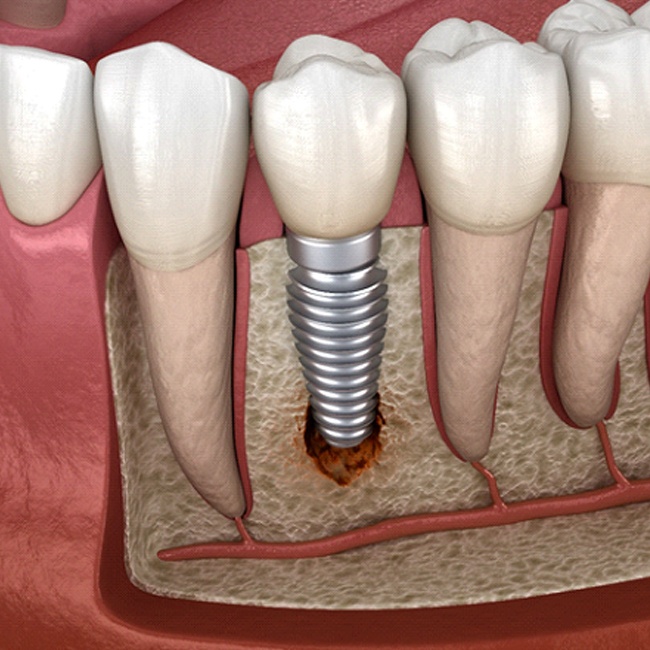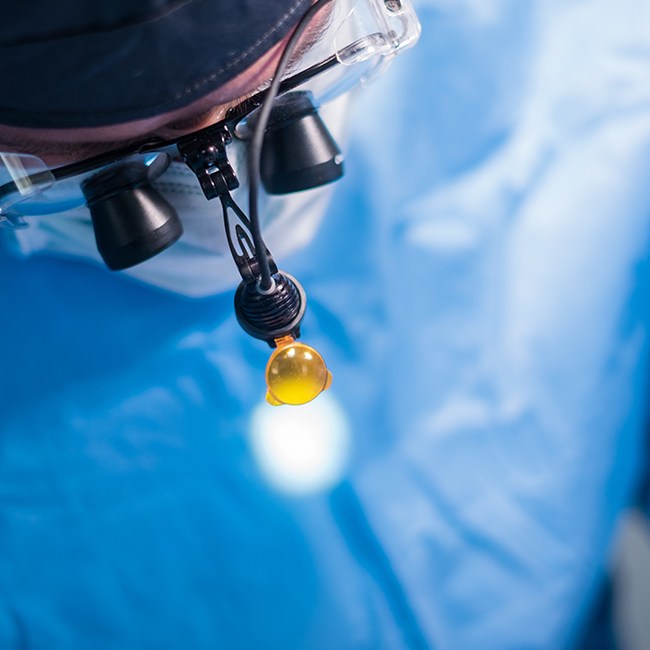Dental Implant Failure & Salvage – Houston, TX
Saving Your Replacement Teeth & Your Smile
Dental implants have a remarkably high success rate — well over 95%! However, complications do sometimes arise with this treatment that jeopardize its long-term viability. If you ever suspect that you are suffering from a failed dental implant in Houston, it is vital that you seek help from a qualified oral surgeon as soon as possible. They may be able to fix the problem and enable you to continue enjoying the full benefits of your restored smile via dental implant salvage services.
Why Do Dental Implants Fail?

The most common culprit behind failed dental implants is an infection called peri-implantitis, which occurs when bacteria attack the tissue around an implant. Eventually, the damage can become so severe that the mouth is no longer able to adequately support the implants. Poor oral hygiene is often a big contributing factor to peri-implantitis.
Other reasons why an implant might fail include:
- A medical condition that affects the patient’s ability to heal after surgery
- An implant breaks
- Insufficient bone to support the implant
- Severe physical trauma to the tissue around an implant
Symptoms of Failed Dental Implants

Dental implant failure can occur at any time. Early failure happens soon after an implant is placed, while late failure can happen months, years, or even decades after the original procedures. Therefore, you should always keep an eye out for signs that something is wrong with one of your dental implants in Houston, including:
- Severe or unusual pain. After your initial healing period, your implants should feel comfortable in your mouth. If they do not, you should see an oral surgeon right away.
- Signs of infection. This includes things like pus, red and swollen gums, receding gums, and persistent bad breath.
- Difficulty chewing. Your implants should enable you to eat virtually anything. Problems in this area are a big red flag.
- An implant feels loose. In some cases, this is a problem with the implant’s restoration. In other cases, the implant itself requires attention.
How Dental Implant Salvage Works

If you notice any signs of implant failure, make an appointment with us right away. The longer a problem persists, the less likely it is that we will be able to address it with conservative treatments.
When you visit us, we will determine if it is possible to save an existing implant. This might be the case if an infection is present but has not had time to cause severe damage. Strong antibiotics along with changes to a patient’s oral hygiene routine may be able to kill harmful bacteria and allow the tissue around the implant to heal.
In other cases, surgical intervention may be necessary to help your smile regain its health and function. Your oral surgeon may simply remove the implant and give your body some time to heal. When sufficient tissue regeneration has occurred and there is no sign of infection, it may be possible to replace an implant. If severe bone loss occurred, we might remove the implant and perform a bone graft. After your body has accepted the new bone, we may be able to place a new implant.
Wisdom Teeth Extractions Oral & Maxillofacial Pathology Oral Cancer Orthognathic Surgery Dental Implants Pre-Prosthetic Surgery Facial Trauma Treatment Apicoectomy Surgery Cleft Lip & Palate Surgery TMJ Treatment Corrective Orthodontic Surgery Sleep Apnea Treatment Anesthesia & Sedation Dentistry Cosmetic Facial Treatments Dental Emergencies View Our Services

